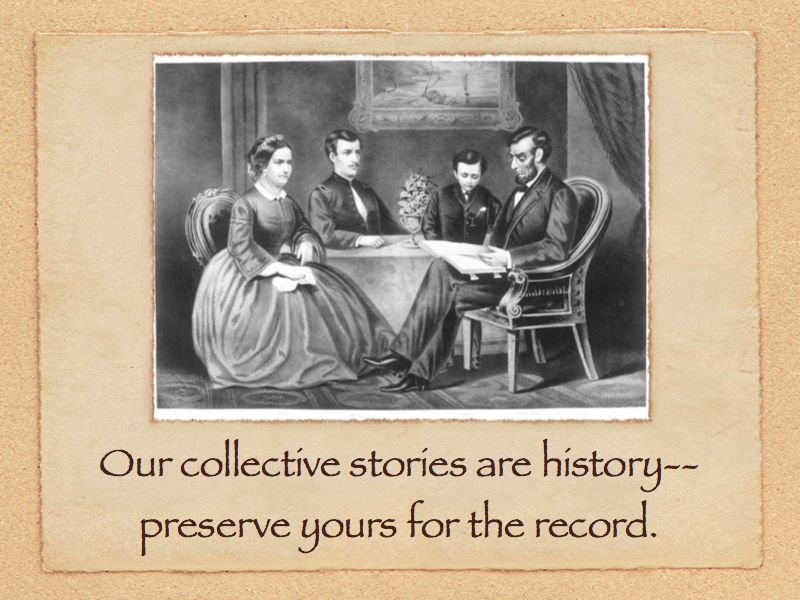You have a story to tell. Just write your story.
I appreciate the dedication of hardworking career writers, those who have spent decades studying and practicing the art and craft of writing. I love literature. I wish everyone could write it; but it takes talent and dedication to write literature.
You don’t need to write a literary masterpiece. You just need to get your story into print.
And you should. So forget about writing The Great Gatsby or Angela’s Ashes or The Liar’s Club, and just write and print your little book.
- Write for yourself; you’ll feel great satisfaction in having written your book!
- Write for your family and friends; they’ll appreciate a glimpse into your heart, mind and soul because, after all, they love you!
- Write for future generations; the genealogists and historians will be incredibly grateful to you!
If you don’t know where to start, click here for help. After you’ve done the first exercise, do the second exercise and then do your first revision (because revising is an integral process of writing).
After you’ve done those tasks, try this revision strategy:
Change your point of view.
You most likely wrote your story (about yourself or your family) in the first person. (I saw, I went, I felt…) Now, rewrite it in the third person. Trust me on this—you can always change it back to first person later.
This is a good exercise. Third person offers you a more objective perspective from which to do the work of making your memory into a readable story. You want your writing to make sense to a reader who doesn’t know you. So pretend that you don’t know yourself. For example, I wrote about myself as a twelve-year-old.
Alone in my bedroom I caressed every ruby bead of the first communion rosary belonging to my neighbor…
Revised to 3rd person it now reads:
Alone in her bedroom, Tracy caressed every ruby bead of the first communion rosary belonging to her neighbor. She recited ten Hail Marys for each mystery, times fifteen mysteries full of grace, one-hundred-fifty petitions for Lexie. It was wrong–it was really, really bad–when Lexie got so drunk she drove her 1972 Mustang off the road and into a steep ditch. And although twelve-year-old Tracy wasn’t supposed to believe in purgatory, she was making sure her dead friend would get out of that painful place. And while she prayed the rosary, she knew she was bad, too, because she was Lutheran and Lutherans don’t pray to the Mother of God. But there she was, fingering those delicious, forbidden ruby beads. Because what if the Catholics were right? And chanting like a nun made her feel sort of bad, but it also made her feel a little bit holy.
After you’ve revised your piece to 3rd person, let your left-brain editor tinker around with your story for a while, keeping in mind the editing strategies I’ve told you about (in this post).
Because even though you’re writing about yourself, you are, in fact, writing your story. And therefore you owe it to the reader, to make your story into a good read.
After all, your reader is going to invest her valuable time. Instead of making a pot of chili, instead of walking on the beach, instead of laughing with friends, instead of earning money, she’ll be reading your words. Take the time to give her good words, coherent sentences and orderly paragraphs.
So try this little trick of turning “I” into “he” or “she.” From a new perspective, you might find it easier to see how the words are–or are not–shaping up into a story. Because you’ll notice less of your self.
Because writing is all about sharing; and sharing is all about the other person.
And because blogging is about sharing, I’d appreciate it if you talked back to me. Feel free to answer either (or both) of the following questions.
So who are you spending all this time writing for? (I’m writing mostly for my grandchildren and great-grandchildren, because I wish my grandparents and great-grandparents had left more of a record for me).
And now that you know that I secretly wanted to become a nun (or better yet, a saint!) when I was a kid; who or what did you secretly hope to become?

Great article! Thanks for sharing this, Tracy!
Thanks for stopping by, vino! I’m really enjoying your blog, too. I love the quizzes!
Very helpful, Tracy. Specific and strong, with an excellent example (the rosary scene). There was an article in one of the writing magazines years ago that suggested taking a favorite, vivid scene from TO KILL A MOCKINGBIRD–maybe one of the courtroom scenes–and write it three ways: once in 3rd person omniscient POV; once in the POV of someone in the jury; and once in first person POV of either Jem or Dill. It was an excellent activity.
I love that book! I think one of the best ways of learning to write, is by reading good writing. And “To Kill a Mocking Bird” is one of the best!!